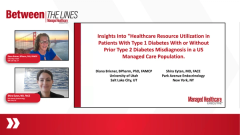
Diagnosing Type 1 Diabetes: Clinical Challenges and Consequences
Panelists discuss how type 1 diabetes is diagnosed using autoantibody testing and the challenges clinicians face, including the common misdiagnosis of adults with type 1 diabetes as having type 2 diabetes due to age bias and the misconception that type 1 diabetes only occurs in childhood.
Episodes in this series

This healthcare executive program examines a study on healthcare resource utilization in patients with type 1 diabetes, particularly focusing on misdiagnosis issues in U.S. managed care populations. The discussion is presented in a journal club format by healthcare professionals including a pharmacist and an adult endocrinologist, who explore the background, methods, results, and clinical relevance of misdiagnosis patterns.
The clinical discussion reveals that type 1 diabetes is properly diagnosed through the presence of at least two out of five available autoantibodies, including insulin autoantibody, zinc transporter antibody, and GAD antibody. However, significant diagnostic challenges exist in clinical practice. Many adult patients experience a “honeymoon phase” where they may not appear hyperglycemic or may have brief periods of hyperglycemia followed by normal glucose levels, which can confuse clinicians. Additionally, there’s a persistent misconception that type 1 diabetes only occurs in childhood, despite the fact that the majority of type 1 diabetes cases are actually diagnosed in adulthood.
The consequences of misdiagnosis are substantial and costly. Adults are frequently misdiagnosed with type 2 diabetes based solely on their age, leading to years of inappropriate treatment with oral hypoglycemic agents that prove ineffective. This results in prolonged periods of uncontrolled blood glucose, wasted healthcare resources, and increased risk of serious complications including hypoglycemia and diabetic ketoacidosis. From both clinical and payer perspectives, these misdiagnoses represent significant concerns about patient safety, treatment efficacy and healthcare resource utilization, highlighting the critical need for proper antibody testing to distinguish between type 1 and type 2 diabetes in adult patients.
Newsletter
Get the latest industry news, event updates, and more from Managed healthcare Executive.






















